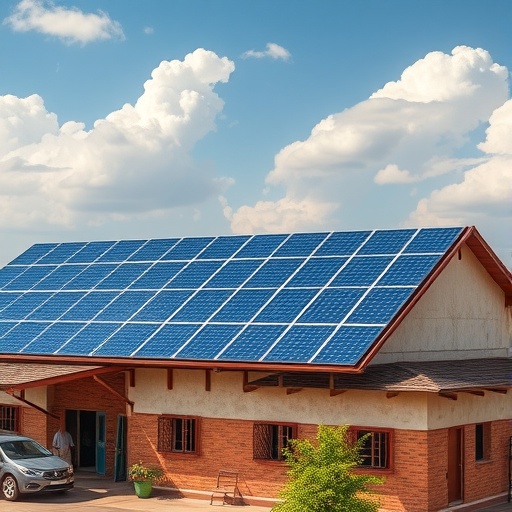Recent research conducted by Wali, Dutta, Sani, and their colleagues sheds light on the socioeconomic dynamics and determinants influencing solar energy adoption in urban environments, specifically focusing on Kano State in Nigeria. As the world increasingly grapples with energy challenges and the implications of climate change, understanding these determinants is crucial for formulating effective policies and strategies to promote renewable energy solutions.
Kano State, with its burgeoning population and urbanization, presents a unique landscape for assessing solar energy adoption. The convergence of rising electricity demand and erratic supply has led to a heightened interest in alternative energy sources. In this context, solar energy emerges as a viable solution that not only mitigates energy shortages but also promotes environmental sustainability. The study dives deep into the complex interplay of various factors that influence the decision-making process for individuals and communities when adopting solar energy technologies.
Key elements identified in the study include income levels, education, awareness of solar technologies, and access to financing. These socioeconomic variables significantly impact not only the likelihood of adopting solar energy solutions but also the scale of installed solar capacity in urban settings. For instance, individuals from higher income brackets are often more inclined to invest in solar systems due to their financial capability to absorb initial installation costs.
The study underscores the importance of education and awareness as pivotal determinants in the adoption process. Those with higher educational attainment are often more informed about the benefits of solar energy, including reduced long-term energy costs and environmental benefits. Consequently, targeted educational initiatives can play a significant role in enhancing public understanding of solar technologies, thus potentially accelerating adoption rates among lesser-informed demographics.
Access to financing is another crucial factor highlighted in the research. The study points out that the availability of affordable financing options can significantly reduce the entry barriers for many potential solar energy users. Many individuals may be interested in solar technologies but are deterred by the high upfront costs associated with installation. Microfinance solutions and government incentives can significantly enhance the accessibility of solar energy systems, facilitating broader adoption.
The geographical context of Kano State plays a significant role in shaping these socioeconomic determinants. As a region with abundant solar resources, the study emphasizes the potential for solar energy utilization to meet urban energy demands effectively. Furthermore, the urbanization of Kano presents both challenges and opportunities in the integration of solar energy systems into existing infrastructure. With urban areas experiencing sharper electricity demand spikes, solar energy can provide a decentralized solution.
Moreover, the research delves into the cultural aspects surrounding energy consumption in urban Kano. Traditional energy sources and practices may pose formidable barriers to solar adoption, particularly among older generations who may be skeptical of new technologies. The study suggests that fostering cultural acceptance of renewable energy solutions through community engagement and positive narratives about solar technologies can help bridge this gap.
Additionally, the role of governmental policies and regulatory frameworks is explored extensively in the research. Supportive policy measures can significantly influence the pace of solar energy adoption. The study argues for comprehensive policy frameworks that not only promote solar energy through incentives but also establish clear regulations for installations, ensuring consumer confidence in the technology.
In tandem with policy considerations, the study illustrates the necessity for robust infrastructure that supports solar energy deployment. This includes not just installation and maintenance of solar panels but also grid connections that facilitate the integration of solar energy into existing electricity systems. Inconsistent electricity supply can be mitigated through improved integration of renewable sources, leading to a more resilient energy grid.
The findings of the research are expected to serve as a valuable resource for stakeholders—including policymakers, researchers, and energy developers—focused on promoting renewable energy solutions in urban contexts. As cities like Kano continue to grow, the insights garnered from this study will be instrumental in navigating the complexities of energy transition pathways.
Ultimately, the research performed by Wali, Dutta, Sani, and their colleagues provides a nuanced understanding of the factors influencing solar energy adoption in Kano’s urban centers. By addressing the socioeconomic determinants and offering pragmatic solutions, the study presents a hopeful outlook for the future of solar energy in Nigeria, aligning with global efforts to transition to sustainable energy systems.
As countries around the world strive to meet energy demands and reduce carbon emissions, the case of Kano State serves as an exemplary model of how localized studies can inform broader energy policies. The adoption of solar energy is not just a technological challenge but a deeply socioeconomic one, requiring a multifaceted approach that incorporates education, financing, policy support, and community engagement.
In conclusion, the momentum for solar energy adoption in urban areas of Kano State not only represents a significant step toward energy sustainability but also highlights the need for a collaborative and informed approach to tackling the multifarious challenges associated with the energy transition. As we look to the future, fostering an ecosystem that supports renewable energy innovations will be essential in shaping a sustainable urban landscape for generations to come.
Subject of Research: Socioeconomic determinants affecting solar energy adoption in urban areas.
Article Title: Socioeconomic determinants of solar energy adoption and installed capacity in urban areas of Kano State, Nigeria.
Article References:
Wali, H.N., Dutta, T., Sani, B. et al. Socioeconomic determinants of solar energy adoption and installed capacity in urban areas of Kano State, Nigeria.
Discov Sustain 6, 1095 (2025). https://doi.org/10.1007/s43621-025-01988-y
Image Credits: AI Generated
DOI: 10.1007/s43621-025-01988-y
Keywords: solar energy, socioeconomic determinants, adoption, Kano State, Nigeria, renewable energy, urban areas, education, financing, policy frameworks.




